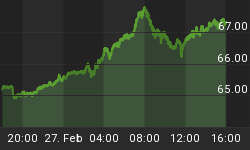An Excerpt from Chapter 1 of The Socionomic Theory of Finance
Few people find a new theory accessible until they first see errors in the old way of thinking. Part I of this book challenges the universally accepted paradigm under which humans' rational reactions to exogenous (external, or externally generated) causes purportedly account for financial market behavior. The current chapter explores whether dramatic news events affect financial markets.
Testing Financial-Market Reaction under Perfect Conditions
In the physical world of mechanics, action is followed by reaction. When a bat strikes a ball, the ball changes course.
Most financial analysts, economists, historians, sociologists and futurists believe that society works the same way. They typically say, "Because so-and-so has happened, it will cause such-and-such reaction." This mechanics paradigm is ubiquitous in financial commentary. The news headlines in Figure 1 reflect what economists tell reporters: Good economic news makes the stock market go up; bad economic news makes it go down. But is it true?

Figure 1
In the second half of the 1990s, a popular book made a case for buying and holding stocks forever. In March 2004, after several terrorist attacks had occurred, the author told a reporter, "Clearly, the risk of terror is the major reason why the markets have come down. We can't quantify these risks; it's not like flipping a coin and knowing your odds are 50-50 that an attack won't occur."
In other words, he accepts the mechanics paradigm of exogenous cause and effect with respect to the stock market but says he cannot predict a major cause part of the equation. The first question is, if one cannot predict causes, then how can one write a book predicting effects? A second question is far more important: Is there any evidence that dramatic news events that make headlines, including terrorist attacks, political events, wars, natural disasters and other crises, are causal to stock market movement?
Suppose the devil were to offer you historic news a day in advance, no strings attached. "What's more," he says, "you can hold a position in the stock market for as little as a single trading day after the event or as long as you like." It sounds foolproof, so you accept.
His first offer: "The president will be assassinated tomorrow." You can't believe it. You are the only person in the world who knows it's going to happen.
The devil transports you back to November 22, 1963. You quickly take a short position in the stock market in order to profit when prices fall on the bad news you know is coming. Do you make money?
To continue reading, follow this link to elliottwave.com
This article was syndicated by Elliott Wave International and was originally published under the headline The Myth of Shocks. EWI is the world's largest market forecasting firm. Its staff of full-time analysts led by Chartered Market Technician Robert Prechter provides 24-hour-a-day market analysis to institutional and private investors around the world.















